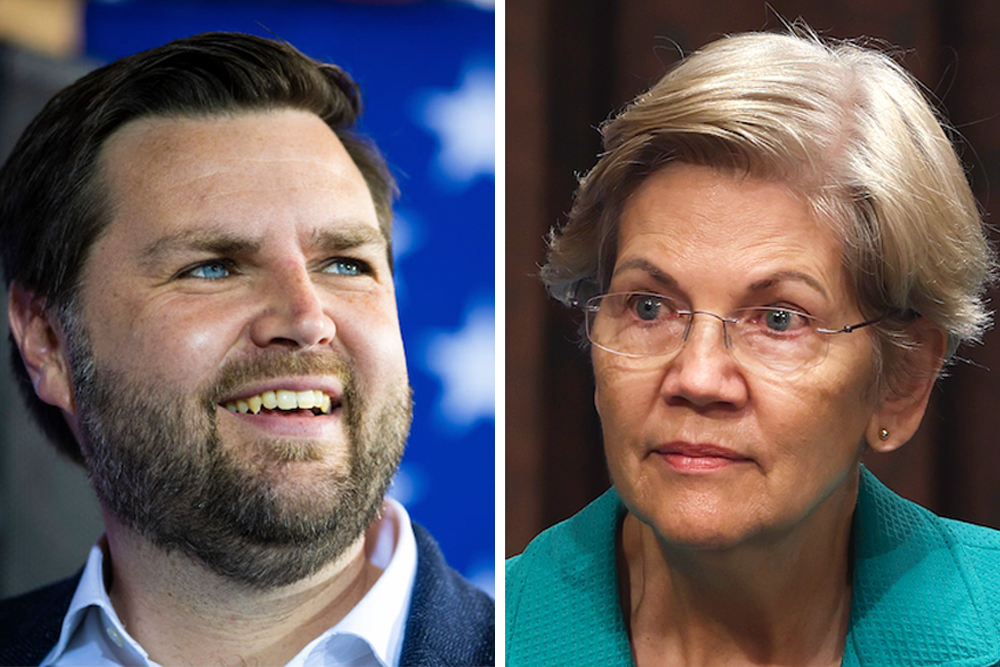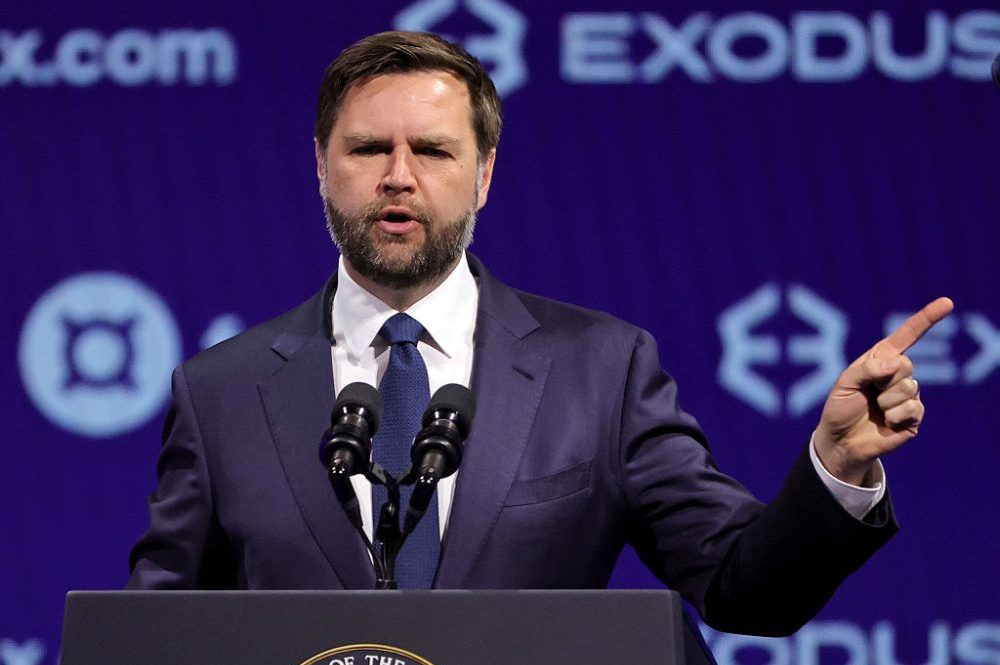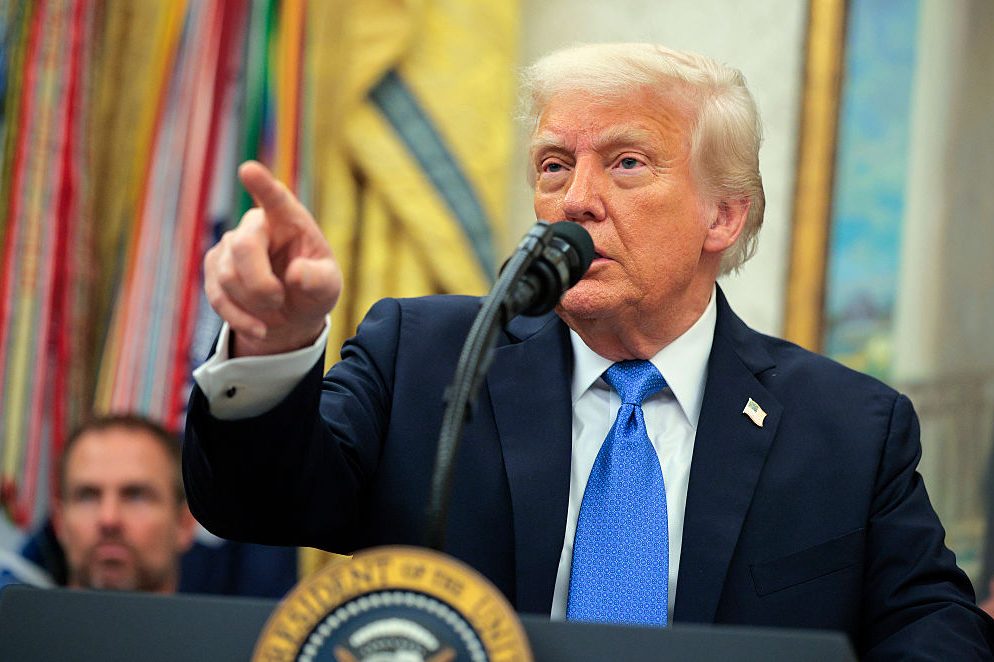They are the Odd Couple of the United States Senate. She is a progressive Democrat and senior senator from true-blue Massachusetts, he a nationalist Republican and junior senator from ever-reddening Ohio. She has a 100 percent rating from the National Abortion Rights Action League; he is “100 percent pro-life.” She wants a path to citizenship for undocumented aliens; he wants a wall and to double the border patrol. She backs a federal assault weapons ban; his hero is his grandmother, who owned nineteen handguns.
Although hailing from different sides of the culture wars, each is articulating material concerns that matter much more to the lives of Americans than whether Bud Light is ‘woke’
No, Elizabeth Warren and J.D. Vance couldn’t be more different, and yet the two have developed an unlikely alliance against the excesses of corporate America. Politico calls them “the new power couple taking on Wall Street” for their work on the Failed Bank Executives Clawback Act (FBECA), a regulatory bill brought forward in response to the March collapse of Silicon Valley Bank. The failure of the institution, and the fact that more than 85 percent of deposits were not insured, left the Federal Deposit Insurance Corporation to assume control of $175 billion worth of accounts. Silicon Valley Bank CEO Greg Becker’s remuneration package in the year leading up to the collapse was just shy of $10 million.
FBECA has since been overtaken by the Recoup Act. An initiative of banking committee chair Senator Sherrod Brown, a populist Democrat from Ohio, Recoup incorporates many of the proposals from the Warren-Vance legislation. It would allow the Federal Deposit Insurance Corporation to recover senior executive pay where banks with assets of $10 billion or more go into receivership. Regulators would be able to claim back bonuses, severance deals and golden parachutes paid out in the three years prior to the bank going under. The aim is to discourage irresponsible risk-taking in pursuit of bigger executive compensation packages.
The $10 billion cut-off is intended to shield smaller, “community” banks, which Vance considers the future of sound banking. Recoup would also expand regulators’ power to remove executives for “gross negligence” in relation to “governance, operations, or risk or financial management.” An amendment tabled by Vance would restrict the circumstances in which “megabanks” are allowed to acquire smaller institutions.
While Recoup is seen as less aggressive than FBECA, it is still a much toothier piece of legislation than major US financial institutions are used to and reflects a new confidence on Capitol Hill about regulatory intervention. Warren says: “This is not just for show. We actually want to make change, and we’ve got a bill where we can get this done.” Vance says: “It strikes me as an especially unfair way to run a banking system, where you can screw things up, pay yourselves out fat bonuses — and then taxpayers end up dealing with the downside risk.”
Both Warren and Vance are examples of elite populists. She is an ex-law professor, belonging to the American managerial class and espousing its vaguely progressive nostrums. He is a venture capitalist and author of Hillbilly Elegy, an account of the hollowing out of small-town America. Although hailing from different sides of the culture wars, each is articulating material concerns that matter much more to the lives of Americans than whether Bud Light is “woke” or “Try That in a Small Town” is recruiting an army of Billboard Country fascists.
The Warren-Vance axis hints at a potential path forward for federal politics. Warranceism isn’t a coherent political philosophy. It is part impatience at an arrogant and unaccountable financial services sector and part opportunism at a time of rising popular anger towards financial and other corporate giants. However ill-defined and whatever its motives, Warranceism could mark the beginnings of a new force in US politics, a counter-weight to pervasive corporate power. Not anti-capitalism, but something pro-democracy and pro-common good.
This is about more than an unlikely partnership between two senators. Enter Sohrab Ahmari, the nuncio of reactionary social democracy. In the last decade, he has gone from neoconservative polemicist at Commentary, extolling the virtues of US firepower and democratic optimism, to scourge of decadent American liberalism, with its Drag Queen Story Hours and false doctrines of institutional neutrality. Ahmari’s turn seems to have come with his conversion to Catholicism, vindicating the old saying about converts and zealots. His one-time colleague James Kirchick summed it up best: “When the Pope hits your eye like a big pizza pie, that’s Ahmari.”
Ahmari’s integralist fervor may be a little intense for some but it has prompted him to rethink some of the shibboleths of America’s political economy. As his new book Tyranny Inc. contends, Americans have fallen victim to “private tyranny,” “a system that allows the asset-owning few to subject the asset-less many to pervasive coercion.” In practice, this refers to the ability of giant corporations and other impersonal behemoths of the market to tear through the lives and communities of ordinary Americans in pursuit of private profit and other ends. As private power has grown, the citizenry’s sphere of influence has narrowed.
Only the most dogmatic market liberal would argue that rising corporate power has been good for the American worker or the American family. Mergers and acquisitions in the under-regulated banking sector? Good for corporations. Outsourcing jobs and shuttering factories in Ohio and Pennsylvania? Good for corporations. Right-to-work, corporate tax breaks, low-skilled immigration? Good, good, good for corporations. Warranceism seems like a chance to apply a brake to corporate America’s untrammeled power to privatize gains and socialize losses. Ahmari fills in the background theory.
What stands out in particular about this moment is that it moves beyond old thinking about “money in politics” and the supposed ability of big corporate donors to buy favorable legislation and maybe even election victories. What really gives big banks and corporations their power is the stranglehold of a bipartisan ideology that says: if it’s good for corporations, it’s good for America. But the opposite is often the case: if Wall Street is happy, Main Street should check its pockets.
While Ahmari makes no such claim himself, his writing provides a blueprint for what Warranceism could be if party politics and tribalism don’t get in the way, which they probably will in the end. Neither Warren nor Vance seems to have lost faith in the free market quite so thoroughly as Ahmari, but there might still be a space opening up for something different. An approach to politics and economics that tempers market liberalism with policies geared towards a more socially cohesive America. While encouraging more small-town and community banks would be a good start, there is a much broader agenda that lies beyond financial regulation, such as extending and cost-cutting health coverage, making childcare more affordable and accessible, and ensuring paid family and medical leave becomes a federal statutory right.
That’s not to say those of us who are liberals should greet Warranceism with enthusiasm. Seldom does anything good come from populists teaming up. It usually means someone’s liberty is in for it. But Warren and Vance each represent a more nuanced version of two ascendent ideologies, and if liberalism is to weather the post-liberal moment, it will have to adapt to survive. Warren and Vance are people we can do business with.
This article was originally published on The Spectator’s UK website.

























